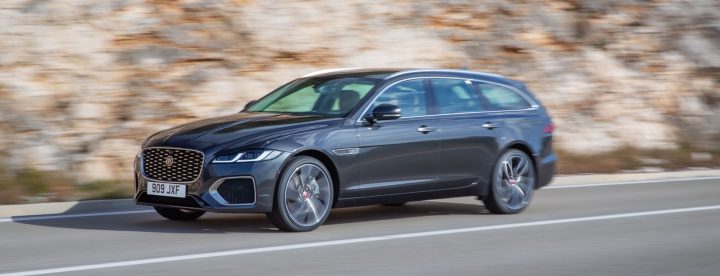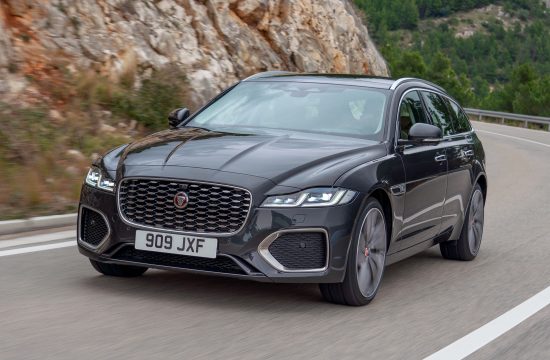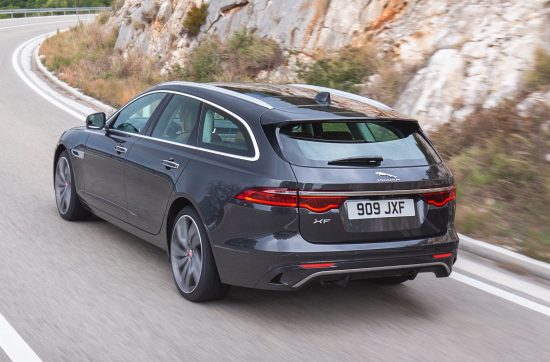Style and sophistication are embodied in the practical and purposeful Jaguar XF Sportbrake and a serious alternative to SUVs.
Introduced in 2017 to widen the appeal of the medium sized XF saloon it sits alongside the now expanding range of Jaguar SUVs and offers a different driving proposition for those who want room but also require a more compact car.
The XF series is a huge range based on saloon or estate body-styles and six trim levels available with rear wheel or all wheel drive transmissions. Engines come as 250 and 300ps petrol or 200ps diesel units and prices range from about £32,600 to £46,600.
Our test car was positioned towards the top of the range of Sportbrake models and standard price was £40,125 and included, smart headlights, powered column, powered sports leather seats, interactive instruments, reverse and blind spot assistance and intelligent cruise control.
Options taking it to £45,000 included fixed full-length glass sun-roof, Meridian Surround Sound System, 19-inch gloss black wheels, exterior pack and privacy glass, Bluefire metallic paint and wireless charging with booster.
It’s a lovely package but spills over the tax threshold and you pay the price for five years.
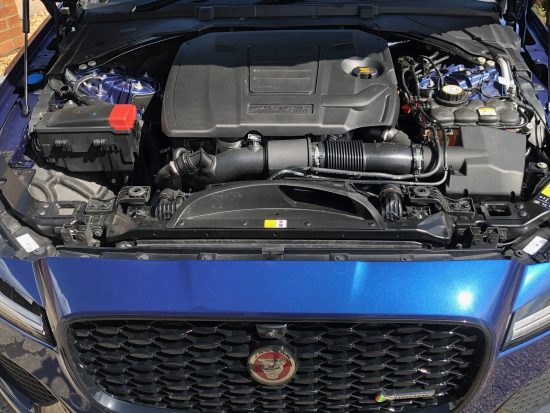 Jaguar’s in-house petrol engines do a great job despite their limited capacity and our version was the lower powered of the range yet it gave good acceleration, composed cruising and was always quiet thanks to a well chosen set of eight gears in the automatic box. It did, however, seem slow to automatically restart when moving off in traffic.
Jaguar’s in-house petrol engines do a great job despite their limited capacity and our version was the lower powered of the range yet it gave good acceleration, composed cruising and was always quiet thanks to a well chosen set of eight gears in the automatic box. It did, however, seem slow to automatically restart when moving off in traffic.
The power delivery was strong, smooth and unhesitating and there was little point in moving into the manual mode unless you really were pressing on.
The downside to the smaller engine was its petrol thirst overall because it had to work hard to deliver the performance, and then you begin to think maybe the diesel engine would be a better proposition if you do a lot of heavy work or cover long distances.
You’d certainly not lose out with the luxury feel of the XF Sportbrake.
 Power steering was excellent with good feel and assistance at speed or in town, a tight turning circle and good electric adjustment range for the driver.
Power steering was excellent with good feel and assistance at speed or in town, a tight turning circle and good electric adjustment range for the driver.
Underfoot, the brakes had power with progression and the parking brake securely held it on hills.
Jaguar engineers have retuned the Sportbrake suspension to cope with additional loading without sacrificing the smoothness synonymous with the brand and they’ve done a very good job. It is slightly firmer than the saloon but really absorbs loads without being hard when lightly laden.
Its lightweight components with Sportbrake selected self-levelling suspension keep everything even and the Dynamic systems mean a driver can fine tune things to suit their personal taste and style.
Secondary controls are familiar on the column and spokes and the big touchscreen in the centre of the console does a multitude of tasks and is very clear to read but we found it a bit slow to respond to some inputs.
The changeable screen infront of the driver displayed the usual speedometer and tachometer with fuel and oil gauges but also contained selectable data including cruise control, lane monitoring and journey details.
Climate control and cabin conditions on the test car included an ionization system for purity and air quality sensor so it was ideal for the hay-fever season.
Temperature control, distribution and volume worked well, backed up by four powered windows and a blind under the full-length sunroof.
Oddments room was good for a family car with decent sized trays, bins and lockable cooled glovebox, seatback pockets and even small compartments in the rear loadspace.
Remote opening of the tailgate revealed a well proportioned, sensibly shaped space with a very good nominal capacity which more than tripled when the one-third/ two-third split seats were dropped forward.
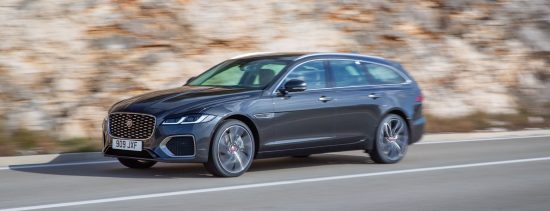 Access was good to the bootspace and to the cabin. Front seats had very good adjustment range, location and support and the smaller back seats were comfortable with plenty of leg and headroom but visibility was limited out of the side windows.
Access was good to the bootspace and to the cabin. Front seats had very good adjustment range, location and support and the smaller back seats were comfortable with plenty of leg and headroom but visibility was limited out of the side windows.
Driver visibility was good to front and sides with excellent washers/ wipers and really useful intelligent headlights at night providing a long and wide beam which sensed oncoming or vehicles ahead and then dipped.
 There are a few blind-spots to the rear but the SE’s reversing camera provided a good view and the Artificial Intelligence “bird’s eye” projection were really helpful. Apart from some tyre rumbles, the Jaguar XF Sportbrake P250 was a quiet car. Engine, exhaust, wind and other mechanical sources were muted and you really felt insulated from the outside world.
There are a few blind-spots to the rear but the SE’s reversing camera provided a good view and the Artificial Intelligence “bird’s eye” projection were really helpful. Apart from some tyre rumbles, the Jaguar XF Sportbrake P250 was a quiet car. Engine, exhaust, wind and other mechanical sources were muted and you really felt insulated from the outside world.
The ride was very compliant and composed with good sharp responses to steering, throttle and brakes and excellent roadholding over good or bad surfaces.
The XF Sportbrake is a great stylish addition to the Jaguar range with a choice of models to suit owners’ tastes, an agility which comes with the brand and a size which accommodates five but is not too big for some drivers who dislike SUVs.

